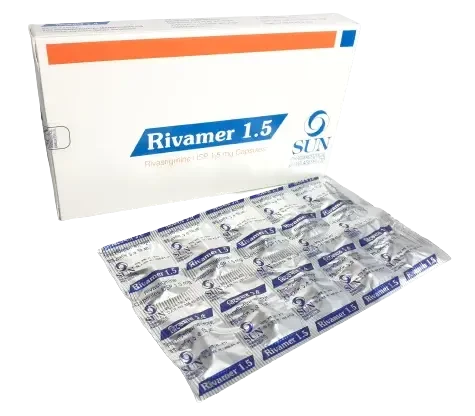
Product Details
Description
Rivamer capsule is indicated for the symptomatic treatment of mild to moderately severe Alzheimer's dementia. Symptomatic treatment of mild to moderately severe dementia in patients with Idiopathic Parkinson's disease. * রেজিস্টার্ড চিকিৎসকের পরামর্শ মোতাবেক ঔষধ সেবন করুন'
Rivastigmine is a carbamate derivative that is structurally related to physostigmine, but not to donepezil and tacrine. The precise mechanism of rivastigmine has not been fully determined, but it is suggested that rivastigmine binds reversibly with and inactivates chlolinesterase (eg. acetylcholinesterase, butyrylcholinesterase), preventing the hydrolysis of acetycholine, and thus leading to an increased concentration of acetylcholine at cholinergic synapses. The anticholinesterase activity of rivastigmine is relatively specific for brain acetylcholinesterase and butyrylcholinesterase compared with those in peripheral tissues.
Rivastigmine capsule- Initial dose: Rivastigmine 1.5 mg twice a day. Dose titration: The starting dose is Rivastigmine 1.5 mg twice a day. If this dose is well tolerated after a minimum of two weeks of treatment, the dose may be increased to Rivastigmine 3 mg twice a day. Subsequent increases to 4.5 mg and then 6 mg twice a day should also be based on good tolerability of the current dose and may be considered after a minimum of two weeks of treatment at that dose level. Maintenance dose: The effective dose is 3 mg to 6 mg twice a day; to achieve maximum therapeutic benefit patients should be maintained on their highest well tolerated dose. The recommended maximum daily dose is 6 mg twice a day. Maintenance treatment can be continued for as long as a therapeutic benefit for the patient exists. Re-initiation of therapy: If treatment is interrupted for more than several days, it should be re-initiated at 1.5 mg twice daily. Dose titration should then be carried out as described above. Rivastigmine transdermal patch: Apply patch on intact skin for a 24-hour period; replace with a new patch every 24 hours. Initial Dose: Initiate treatment with 4.6 mg/24 hours Rivastigmine transdermal patch. Dose Titration: After a minimum of 4 weeks, if tolerated, increase dose to 9.5 mg/24 hours, which is the minimum effective dose. Following a minimum additional 4 weeks, may increase dosage to maximum dosage of 13.3 mg/24 hours. Mild to Moderate Alzheimer's Disease and Parkinson’s Disease Dementia: Rivastigmine transdermal patch 9.5 mg/24 hours or 13.3 mg/24 hours once daily. Severe Alzheimer’s Disease: Rivastigmine transdermal patch 13.3 mg/24 hours once daily. For treatment interruption longer than 3 days, retitrate dosage starting at 4.6 mg per 24 hours.
As a cholinesterase inhibitor, Rivamer may exaggerate the effects of succinylcholine-type muscle relaxants during anaesthesia. Caution is recommended when selecting anaesthetic agents. Possible dose adjustments or temporarily stopping treatment can be considered if needed. In view of its pharmacodynamic effects, rivastigmine should not be given concomitantly with other cholinomimetic substances and might interfere with the activity of anticholinergic medicinal products. No pharmacokinetic interaction was observed between rivastigmine and digoxin, warfarin, diazepam or fluoxetine in studies in healthy volunteers. The increase in prothrombin time induced by warfarin is not affected by administration of rivastigmine. No untoward effects on cardiac conduction were observed following concomitant administration of digoxin and Rivamer.
The most commonly reported adverse reactions are gastrointestinal, including nausea (38%) and vomiting (23%), especially during titration. Female patients in clinical studies were found to be more susceptible than male patients to gastrointestinal adverse reactions and weight loss.
For Rivastigmine no clinical data are available. Rivastigmine should not be used during pregnancy unless clearly necessary. In animals, rivastigmine is excreted into milk. It is not known if rivastigmine is excreted into human milk. Therefore, women on rivastigmine should not breast-feed.
Patients with sick sinus syndrome or conduction defects, resp diseases. Cholinergic stimulation may increase gastric acid secretion. May exacerbate urinary obstruction and seizures. Pregnancy. Renal impairment, mild to moderate hepatic impairment. Monitor body wt. Asthma or obstructive pulmonary disease. May worsen extrapyramidal symptoms. Lactation.
-
Support 24/7
Call us anytime -
100% Safety
Only secure payments